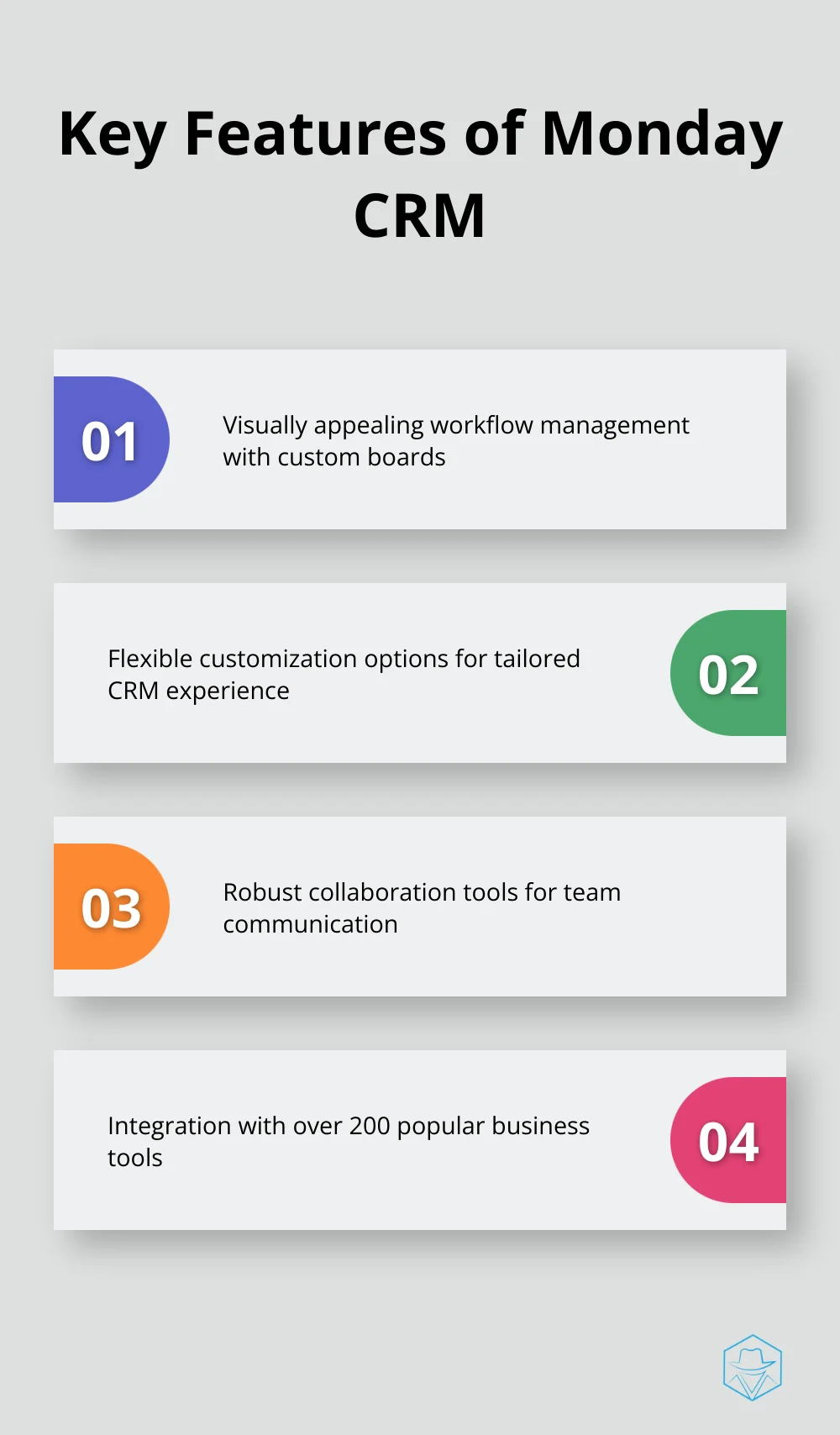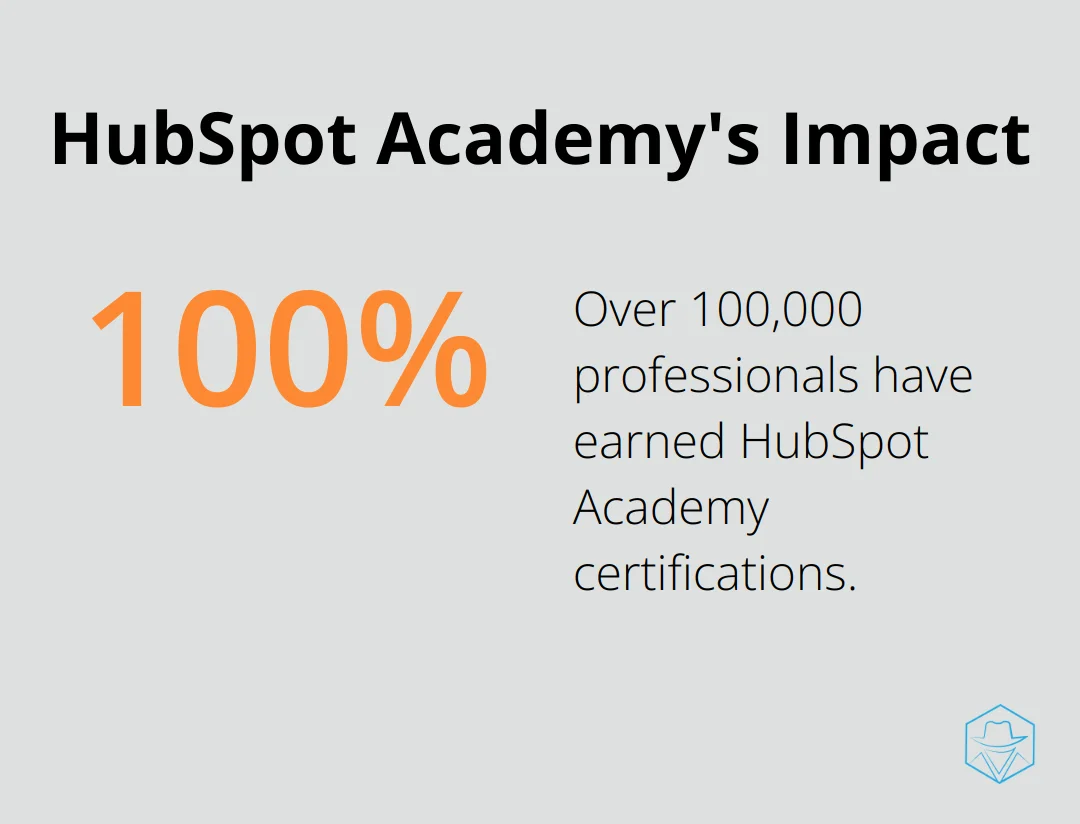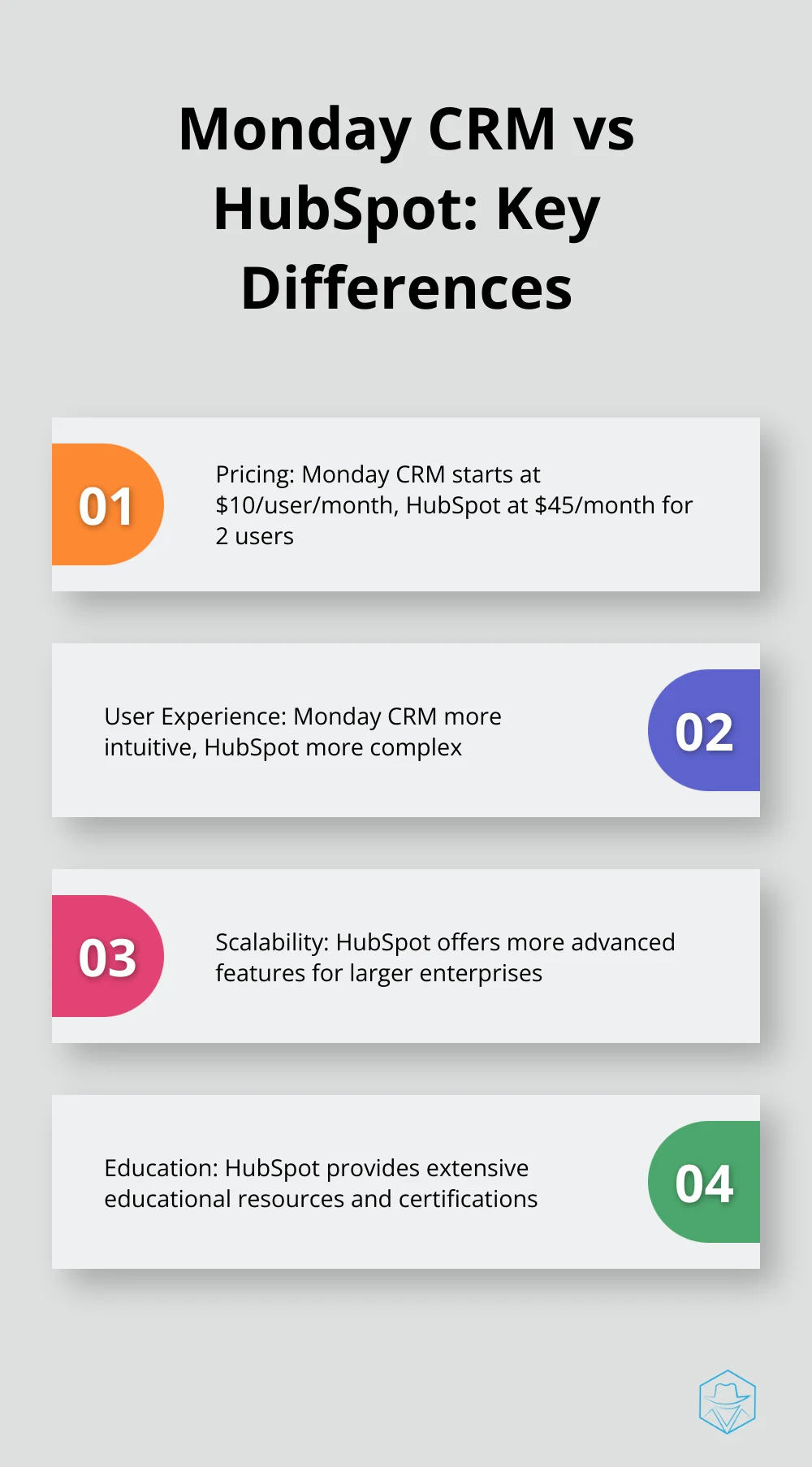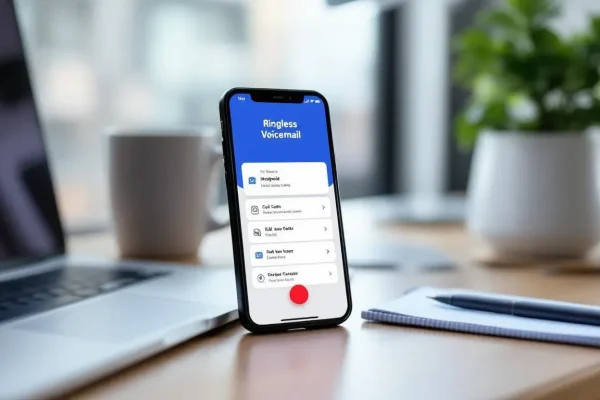Monday or HubSpot: Choosing Your Ideal CRM

Choosing the right CRM can make or break your business operations. At Drop Cowboy, we understand the importance of this decision, which is why we’re diving into the Monday vs HubSpot debate.
These two popular CRM platforms offer unique features and benefits, catering to different business needs and goals. In this post, we’ll compare their key features, pricing, and overall value to help you make an informed choice for your organization.
What Makes Monday CRM Stand Out?
Monday CRM has carved out a unique position in the CRM market with its focus on visual project management and team collaboration. The platform adapts to various workflows and business processes, helping teams work more efficiently.
Visually Appealing Workflow Management
Monday CRM’s standout feature is its visually appealing interface. Users can create custom boards that represent different workflows, projects, or sales pipelines. These boards use a colorful, intuitive design that makes it easy to track progress at a glance. A sales team can set up a board that shows leads moving through different stages of the sales funnel (with each stage represented by a different color).
Flexible Customization Options
Monday CRM excels in flexibility. Users can create custom fields, adjust column types, and set up automations to fit their specific needs. This level of customization allows businesses to tailor the CRM to their unique processes rather than adapting their processes to fit the CRM. A marketing team could create a custom board for campaign management with fields for budget, timeline, and performance metrics.
Robust Collaboration Tools
Team collaboration is at the heart of Monday CRM. The platform offers features like in-context comments, @mentions, and file sharing, making it easy for team members to communicate and stay updated on projects. These tools can significantly reduce the need for separate communication channels, keeping all project-related discussions in one place.

Integration Capabilities
Monday CRM integrates with over 200 popular business tools, including Gmail, Slack, and Zoom. These integrations allow for seamless data flow between different platforms, reducing manual data entry and improving overall efficiency. A team could set up an automation that creates a new item in Monday CRM whenever a form is submitted through their website.
While Monday CRM offers impressive features, it may not be the best fit for all businesses. Companies looking for a more traditional CRM with advanced sales and marketing automation might find platforms like HubSpot or Drop Cowboy more suitable. Drop Cowboy, in particular, offers unique features like ringless voicemail and SMS integration, which can be game-changers for businesses focused on direct customer communication and engagement.
As we move on to explore HubSpot CRM, it’s important to consider how its features compare to Monday CRM and how they align with your specific business needs.
What Makes HubSpot CRM a Powerhouse?
HubSpot CRM has established itself as a formidable player in the CRM market, offering a comprehensive suite of tools that extend beyond basic customer relationship management. The platform unifies marketing, sales, and service functions under one roof, providing a powerful solution for businesses of all sizes.
Unified Platform for Growth
HubSpot’s primary advantage lies in its all-in-one approach. The platform integrates marketing, sales, and customer service tools, allowing businesses to manage the entire customer lifecycle from a single dashboard. This integration eliminates the need for multiple software solutions and reduces data silos (a common challenge for many organizations). Companies can streamline their operations and create a more cohesive customer experience across all touchpoints.
Freemium Model with Scalability
One of HubSpot’s most attractive features is its freemium model. The basic CRM is free, which allows businesses to test the platform without financial commitment. As companies grow and require more advanced features, they can opt for paid add-ons or upgrade to higher-tier plans. This scalability makes HubSpot an appealing option for startups and small businesses that anticipate rapid growth.
Data-Driven Decision Making
HubSpot’s analytics and reporting capabilities provide businesses with actionable insights. The platform offers detailed reports on marketing campaign performance, sales pipeline health, and customer service metrics. Users can track email open rates, click-through rates, and conversion rates, which enables data-driven optimization of marketing strategies. This level of insight empowers businesses to make informed decisions and continuously improve their processes.
Learning and Development Focus
HubSpot invests heavily in educational resources, offering an extensive library of courses, certifications, and training materials through HubSpot Academy. This commitment to user education proves particularly valuable for teams new to CRM systems or those looking to expand their digital marketing skills. Over 100,000 professionals have earned certifications through their academy, demonstrating the platform’s dedication to user growth and development.

While HubSpot offers a comprehensive solution, some businesses may find its extensive feature set overwhelming or unnecessary for their specific needs. In such cases, more focused solutions like Drop Cowboy, which specializes in ringless voicemail and SMS marketing, might be a better fit. Drop Cowboy’s unique features (such as Mimic AI™ technology for voice cloning) can significantly enhance personalized outreach efforts.
As we compare Monday and HubSpot, it’s essential to consider how each platform aligns with your specific business needs and goals. Let’s explore the key differences between these two CRM giants and help you determine which one might be the right choice for your organization.
Monday vs HubSpot: Which CRM Fits Your Business?
Pricing and Value Comparison
Monday CRM offers a straightforward pricing structure, starting at $10 per user per month for their basic plan. This can prove more cost-effective for small teams or startups. HubSpot’s pricing is more complex, with a free basic CRM and paid plans starting at $45 per month for two users. While HubSpot’s free plan attracts many, essential features often require higher-tier plans.
Businesses with tight budgets might prefer Monday CRM. However, companies needing advanced marketing and sales features could find more value in HubSpot’s higher-tier plans long-term.
User Experience and Adoption
Monday CRM boasts an intuitive, visually appealing interface. Its drag-and-drop functionality and customizable boards allow teams to adapt quickly. HubSpot, while powerful, presents a steeper learning curve due to its extensive feature set.
Teams looking to implement a CRM quickly and effectively might lean towards Monday CRM. However, organizations willing to invest time in training for a more comprehensive tool could benefit from HubSpot.
Scalability for Business Growth
HubSpot excels in scalability. Its tiered pricing model and extensive feature set suit businesses from startups to enterprises. As businesses grow, they can add more advanced features without switching platforms.
Monday CRM, while scalable to an extent, may not offer the same level of advanced features for larger enterprises. It suits small to medium-sized businesses or teams that prioritize project management alongside CRM functionality.
Companies anticipating rapid growth or needing advanced marketing and sales features in the future might find HubSpot a better long-term investment. Businesses focused on team collaboration and project management with CRM capabilities could find Monday CRM ideal.
Industry-Specific Considerations
Both platforms cater to a wide range of industries, but with different strengths. Monday CRM excels in industries requiring strong project management and team collaboration (such as marketing agencies or software development firms).
HubSpot, with its robust marketing and sales features, often appeals to B2B companies, e-commerce businesses, and organizations with complex sales cycles.
When making your choice, consider your industry-specific needs. If your business requires specialized features not offered by either platform, you might want to explore alternatives like Drop Cowboy, which offers unique capabilities such as ringless voicemail and SMS marketing.
Customer Support and Resources
HubSpot invests heavily in educational resources, offering an extensive library of courses, certifications, and training materials through HubSpot Academy. This commitment to user education proves particularly valuable for teams new to CRM systems or those looking to expand their digital marketing skills.
Monday CRM provides robust customer support and a knowledge base, but may not offer the same depth of educational resources as HubSpot.
Companies valuing ongoing education and skill development might prefer HubSpot’s extensive resources. Those prioritizing immediate support and a shorter learning curve could find Monday CRM more suitable.

Final Thoughts
Monday vs HubSpot presents a choice between visual project management and comprehensive customer lifecycle management. Monday’s intuitive interface and customizable workflows appeal to businesses prioritizing team collaboration, while HubSpot’s all-in-one solution integrates marketing, sales, and customer service functions. Your decision should align with your specific business goals, budget constraints, and growth plans.
Consider factors such as pricing structure, scalability, and industry-specific needs when selecting your CRM. HubSpot’s extensive feature set and tiered pricing model suit businesses anticipating rapid growth, whereas Monday’s straightforward pricing may attract small teams or startups with limited budgets. Both platforms offer unique strengths, but they might not fit every organization’s requirements perfectly.
For businesses seeking innovative communication solutions, Drop Cowboy offers features like ringless voicemail and SMS marketing with AI-powered voice cloning (which can enhance personalized outreach efforts). We recommend you assess your needs, test different options, and select a CRM that supports your current and future business objectives.
blog-dropcowboy-com
Related posts

March 5, 2025
Best Ringless Voicemail Apps for Your Business
Explore top ringless voicemail apps to boost business communication and efficiency. Discover features, benefits, and how they can fit your needs.

August 11, 2025
Slybroadcast api
Explore Slybroadcast API capabilities for seamless business communication. Learn how it enhances efficiency and connects effortlessly with audiences.

July 20, 2025
Marketing Automation Best Practices for Success
Boost your marketing efficiency by adopting proven marketing automation best practices. Optimize your strategies for better engagement and success.

June 23, 2025
Sinch Mailgun: Revolutionizing Email Delivery
Explore how Sinch Mailgun boosts email delivery, enhances open rates, and optimizes communication with cutting-edge tools for businesses.

June 16, 2025
Master Automated Voicemail Messages: Essential Guide
Reaching customers shouldn’t feel like a full-time job. We’ve all been there — dialing endlessly, leaving messages by hand, and wondering if anyone’s even listening. In 2025, busy schedules and call screening make that approach tougher than ever. That’s why we’re turning to an automated voicemail message to cut through the chaos. With the right setup, we […]

September 3, 2025
Innovative Applications of Voice Cloning in Customer Service
Explore voice cloning applications in customer service, enhancing efficiency and personalization. See how innovation reshapes customer interactions.